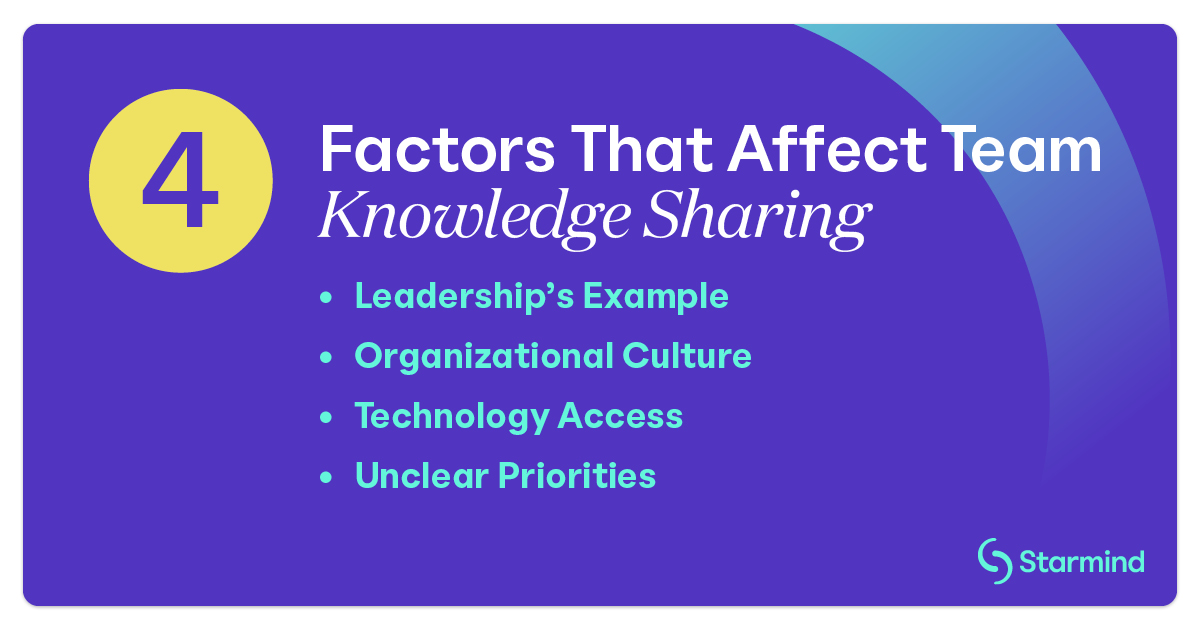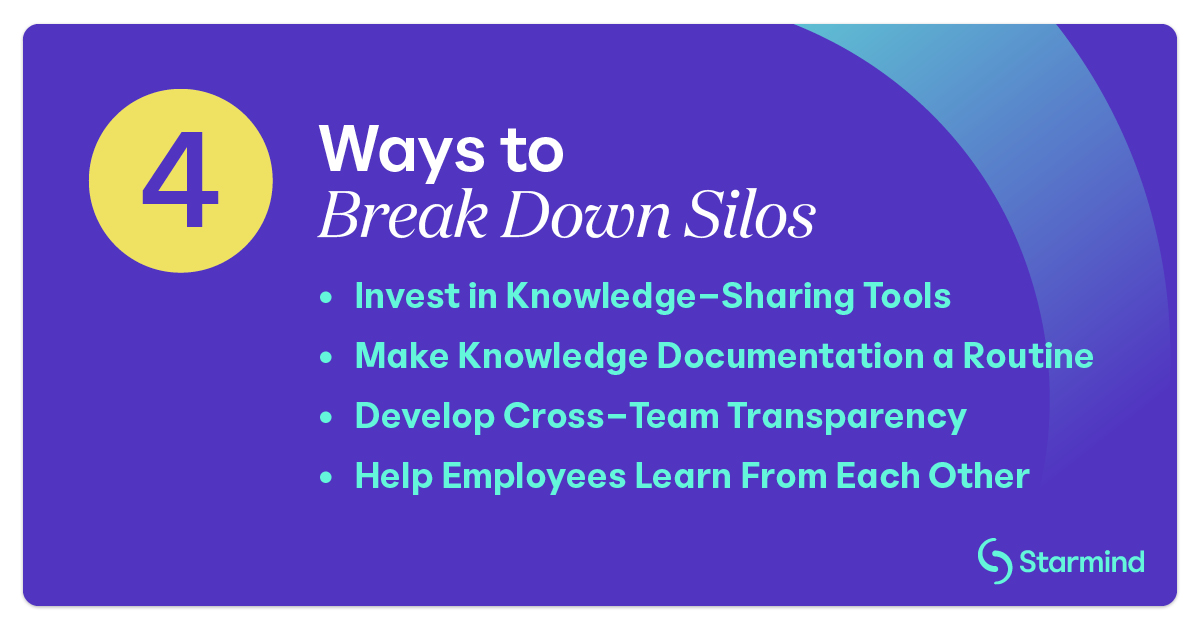Contents
How many people does the average employee interact with daily? How many of these interactions involve meaningful knowledge sharing? Many employees compound this lack of information sharing by gravitating toward co-workers with similar interests, experiences and goals. The challenge for your enterprise is creating a culture where sharing knowledge with others is easy.
Almost every team and organization can benefit from improved communication and knowledge management. For example, sales teams always want more time for developing new business. Help desks exist to provide answers and solutions, but they need a small ticket queue so they can focus on complicated, novel issues. Research and development (R&D) teams are all about game-changing innovation and need to know they aren’t replicating their colleagues’ work.
What do these teams have in common? Too often, they spend their time trying to ask questions or get answers instead of focusing on their core tasks.
When you improve methods of sharing knowledge within an organization, you break down information silos and make it easier for your teams to access the information they need — when they need it. Not only do your employees get easy access to crucial information, but they can also contribute their expertise and experiences for future use.
Get started by learning more about why knowledge sharing in the workplace is important and how to improve your organization’s approach.
What Is Knowledge Sharing in Organizations?
Knowledge sharing can be defined simply as transferring knowledge from one person to another. A modern knowledge management process also considers how knowledge is collected, retained and shared for future use.
In the early days of knowledge management, organizations focused on documenting knowledge to be referenced as needed. While documentation has a role in knowledge management, this process is insufficient, as up to 80% of an organization’s knowledge is undocumented.
Modern knowledge management accounts for this missing information in a few ways, including creating a central place for quickly and easily accessing information. Effective knowledge management systems also identify subject matter experts who can provide assistance and answers when needed.
Why Is Knowledge Sharing Important?
Knowledge sharing is fundamental to organizational communication and problem-solving, enabling people to do their jobs. However, the benefits of knowledge management extend far beyond smooth workflows and operations.
One of the most obvious benefits of effective knowledge sharing is the time your teams save by having easy access to the information they need. Research indicates that in companies with more than 10,000 employees, team members spend 102 minutes every day searching for information to do their jobs. This time is better spent elsewhere, if only your teams knew where to go for real-time insights.
For example, consider the time your salespeople spend tracking down information to answer customers’ questions, research prospects and close deals. Hunting for information is potentially the most time-consuming part of their job. Knowledge-sharing resources, including access to expert colleagues with similar experiences and tacit knowledge, can cut down time spent searching for answers so they can focus on selling.
Access to knowledge can help any team that relies on communication, collaboration and problem-solving. Help desks benefit from reduced support ticket queues when employees have access to knowledge to resolve their own issues. R&D teams can quickly access existing insights and results, contributing to higher-quality innovation and faster time to market.
Modern knowledge management also ensures that knowledge isn’t lost or misplaced as employees leave or transition to another role. Expertise can be documented through a central platform, freeing teams from time spent manually updating numerous knowledge bases. Employees can contact subject matter experts for assistance when a documented answer is unavailable. This multifaceted collaboration breaks down silos and ensures the most critical information is available to everyone who needs it.
A knowledge management system can enable these experienced employees to share knowledge, regardless of their position, department or geographic location.
 Factors That Affect Team Knowledge Sharing
Factors That Affect Team Knowledge Sharing
Knowledge sharing is a continuous process affected by many internal and external factors. Here are some tangible and intangible factors many organizations encounter when assessing their knowledge management or making improvements.
Leadership
Your organization focuses on what your leadership team believes is important. When knowledge sharing is a leadership priority, you’ll see more investment of money, training and resources for employees. Senior executives can lead by example when they sponsor knowledge-sharing activities and connect organizational benchmarks to the availability of knowledge.
Organizational Culture
Silos can occur unintentionally when small teams work closely together on specific projects. When you instill a culture of open communication, employees are naturally more likely to reach beyond their closest connections and share insights with their colleagues. Make knowledge-sharing tools a part of your everyday workflows, and instill generosity, curiosity and collaboration into your organizational values.
Technology Access
Your culture and leadership examples can raise employee awareness of knowledge sharing’s value. But employees can’t turn those good intentions into results if they don’t know what technology to use or how to use it.
Teams organically create millions of data points every day. They need resources like knowledge management systems and artificial intelligence to direct their efforts at knowledge sharing and develop work habits that align with knowledge-focused goals. And employees need to easily access these tools, whether to find information or contribute their expertise.
A modern knowledge management system like Starmind can take that data, build a real-time network of your organization’s knowledge and connect employees with the answers they need.
Unclear Priorities
When your priorities, goals and strategies aren't aligned, your teams lack direction and don't know where to turn for assistance. Teams should have numerous ways of accessing clarity, including clear goals, regular check-ins with their managers, projects and performance reviews, and other verified, up-to-date information sources.
Help your employees understand how their work contributes to the success of their co-workers and the organization.
What Are Information Silos, and What Causes Them?
Information silos are created when individuals or teams in your organization hoard knowledge instead of sharing it broadly across your enterprise. Sometimes this is intentional, as employees want to be seen as an authority or hoard knowledge out of fear.
Frequently, however, silos are the byproduct of teams or departments focusing on their core work without thinking about how that knowledge could benefit the entire organization. These teams may be unaware of other projects in the company that could use their knowledge and experience. Or they might not be able to contribute their knowledge in a standardized way. Teams can also be victims of silos when they search for answers that already exist but aren’t accessible or even known to them.
 How to Break Down Information Silos
How to Break Down Information Silos
Invest in Knowledge-Sharing Tools
Most companies have some knowledge base available, but this still leaves most of the knowledge in an organization inaccessible and/or undocumented. A modern knowledge management system can build a bridge between documented knowledge and subject matter experts who can fill gaps.
Effective implementation of knowledge-sharing tools, such as internal knowledge bases, results in more informed and empowered team members. Your employees can self-resolve issues without requiring additional time and resources, which helps sales teams, help desks and R&D teams be more efficient. Artificial intelligence can utilize a real-time knowledge network to find the most informed team members with topical knowledge when there isn’t a documented solution.
It’s important to manage knowledge bases effectively, as knowledge and information can change over time and require regular review and updates.
Make Knowledge Documentation a Routine
Documenting all of your organization’s knowledge is an overwhelming task. Instead, focus on creating documentation routines based on natural workflows and your current situation. If you document knowledge as needed, you can begin to identify the most relevant and essential information for your teams.
As you build toward a complete knowledge base, make it easy for teams to share their knowledge and ask questions, including anonymously. This ease of use and privacy will drive employee adoption of your knowledge management platform.
Develop Cross-Team Transparency
Teams operating in an open, transparent culture can better align their work to the company’s overall strategy and goals. When these teams collaborate across teams and functions, they unlock opportunities for new insights and innovation. For example, you can build project teams from top-performing employees regardless of what department they sit in.
These combined efforts can help identify and solve problems faster by utilizing the strengths of individuals and sharing outcomes and best practices. Cross-functional collaboration and transparency help employees feel more connected, understand what their colleagues are working and see how their work contributes to the organization’s goals.
Help Employees Learn From Each Other
Collaboration allows your teams to achieve better results more quickly, and it can also improve employee skills. Encourage such learning and development by providing knowledge and skill-sharing sessions where employees can learn from their top-performing colleagues.
Formal sessions for exchanging information can encourage curiosity, inspire cross-training and showcase your subject matter experts. Those experts will appreciate the recognition, while your workforce will better understand how everyone’s knowledge fits together.
Driving Growth and Success With Knowledge Sharing
Knowledge sharing is an essential component of any successful workplace project or team. When knowledge is easily accessible, your teams waste less time searching and can pursue optimal results at a faster speed.
You can take many actions to improve how your organization shares knowledge. Look holistically at the cultural, communication and technological factors holding you back — and what you’re already doing well. You’ll develop a more engaged and productive team by creating an open, communicative culture that embraces sharing knowledge with others.
Discover how to improve your team’s efficiency to secure more sales.



